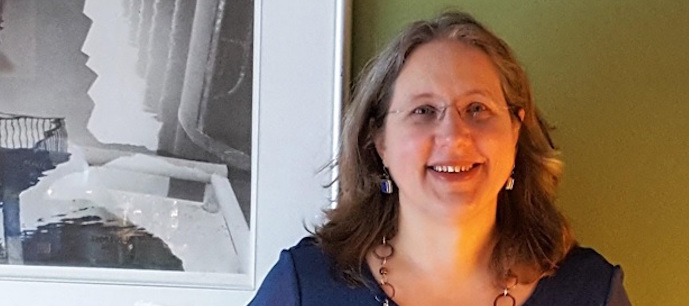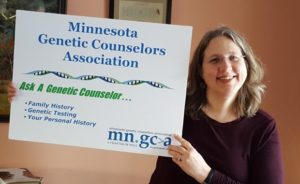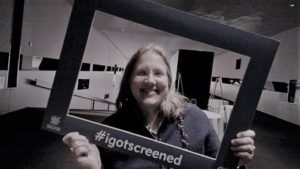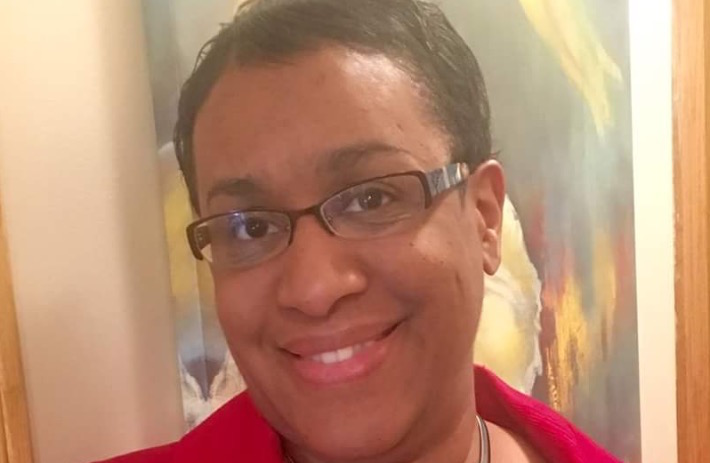
I am a cancer genetic counselor – a healthcare provider for families who have hereditary cancer risk. Over the last 18 years I have searched for inherited causes of colon cancer for hundreds of families, by providing genetic counseling services and coordinating genetic testing through a cancer center clinic in the Twin Cities. I am drawn to this work because many cancers can be prevented, and lives saved, if a genetic diagnosis of increased risk is identified and then used to guide care in these families.
 Looking for a hereditary cause is a little like being Sherlock Holmes. We look for clues in someone’s personal and family history, follow the leads, and see if a discovery can be made through genetic testing. It is rewarding to use these skills to identify patterns of cancer in families. Fortunately, new multi-gene tests help this effort, by looking at many genes and different causes of hereditary colon cancer in one test. These genetic tools will continue to improve and will provide even more answers in the near future.
Looking for a hereditary cause is a little like being Sherlock Holmes. We look for clues in someone’s personal and family history, follow the leads, and see if a discovery can be made through genetic testing. It is rewarding to use these skills to identify patterns of cancer in families. Fortunately, new multi-gene tests help this effort, by looking at many genes and different causes of hereditary colon cancer in one test. These genetic tools will continue to improve and will provide even more answers in the near future.
I get asked what the value of genetic testing is, when someone can already see that their family history contains many relatives with colon cancer. The main value is that if a specific cause can be found, they can get better, more personalized care, as can their relatives. The timing of when to start colon surveillance and how often to repeat colonoscopies can be personalized, rather than basing it on family history alone. Results can be also show that surveillance is needed for other cancers that are linked with the specific inherited cause. Surgical cancer prevention decisions can also be guided by this genetic information, such as complete hysterectomy after childbearing for women with Lynch syndrome to reduce the chance of uterine and ovarian cancer. Family members could also learn through testing that they have not inherited the known risk in the family.
Over the years, helping and supporting these families has become more personal for me. I remember the names, faces and stories of many of my patients who have fought colon cancer. I see the value in trying to understand what is going on before more cancers occur in the family, to help them, as well as their children, brothers, sisters and other relatives. I have seen firsthand when the diagnosis of an inherited condition has led relatives to use that information to get earlier colonoscopies. I know many families where advanced polyps were found and removed through that surveillance, polyps found before they became cancers.
 I am honored to do this work with families. I often meet with them at the most challenging and frightening times in their lives. They may still be stunned with a new diagnosis, or dealing with treatment decisions, or side effects of chemotherapy, or recovering from surgery. I know it takes courage to meet with a genetic counselor, and to talk about your family when cancers have caused personal loss and suffering. It can be especially difficult to explore the possibility that there is an inherited risk that other relatives may also have. As difficult as it is, many patients share that they learn a lot during these visits, can make better decisions about genetic testing, and feel empowered with more knowledge.
I am honored to do this work with families. I often meet with them at the most challenging and frightening times in their lives. They may still be stunned with a new diagnosis, or dealing with treatment decisions, or side effects of chemotherapy, or recovering from surgery. I know it takes courage to meet with a genetic counselor, and to talk about your family when cancers have caused personal loss and suffering. It can be especially difficult to explore the possibility that there is an inherited risk that other relatives may also have. As difficult as it is, many patients share that they learn a lot during these visits, can make better decisions about genetic testing, and feel empowered with more knowledge.
When I meet with someone who has a new colon cancer diagnosis, often at a young age, I share their frustration when they have a genetic diagnosis that was not found earlier. Sometimes their family history was suspicious for an inherited risk, but these clues were not acted on. The inherited risk was not identified earlier so they were not offered the proper surveillance. We miss opportunities for cancer prevention and early detection, when families are not aware that genetic counseling and testing is an option available for them, that they would qualify for these services, or that these services even exist.
Families with hereditary cancer need more advocates. That is why I devote energy to raising awareness about hereditary cancer and genetic services. I am passionate about providing education to the public and healthcare professionals through public speaking and writing, and other creative ways to share this information. That is why I am a face of Blue.
 The Colon Cancer Coalition has been a powerful voice for awareness. I remember when the first Get Your Rear in Gear event was held. I was so happy to see that this organization was putting a public face on a cancer that is too often ignored. It is so gratifying to see the growth in these events nationwide and to know the help that it is providing in so many communities.
The Colon Cancer Coalition has been a powerful voice for awareness. I remember when the first Get Your Rear in Gear event was held. I was so happy to see that this organization was putting a public face on a cancer that is too often ignored. It is so gratifying to see the growth in these events nationwide and to know the help that it is providing in so many communities.
My wish for Colon Cancer Awareness Month is that we continue to find ways to prevent colon cancers. I want the public, families touched by colorectal cancer, and healthcare providers to be more aware of the indications for hereditary colon cancer, so that more families can be offered genetic services. If we can all step into the space of trying to learn more, we can use that information to change the stories in families, and save lives.
Return To Faces Of Blue Learn More About Colon Cancer & genetics Get Your Rear In Gear- Twin Cities, MN

I’ve known Barb for about 45 years and there is no one I’d rather have on my team when dealing with cancer. Thanks, Barb, for your passion and compassion and your intellect!